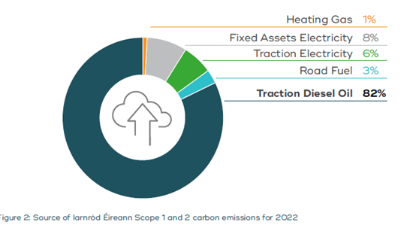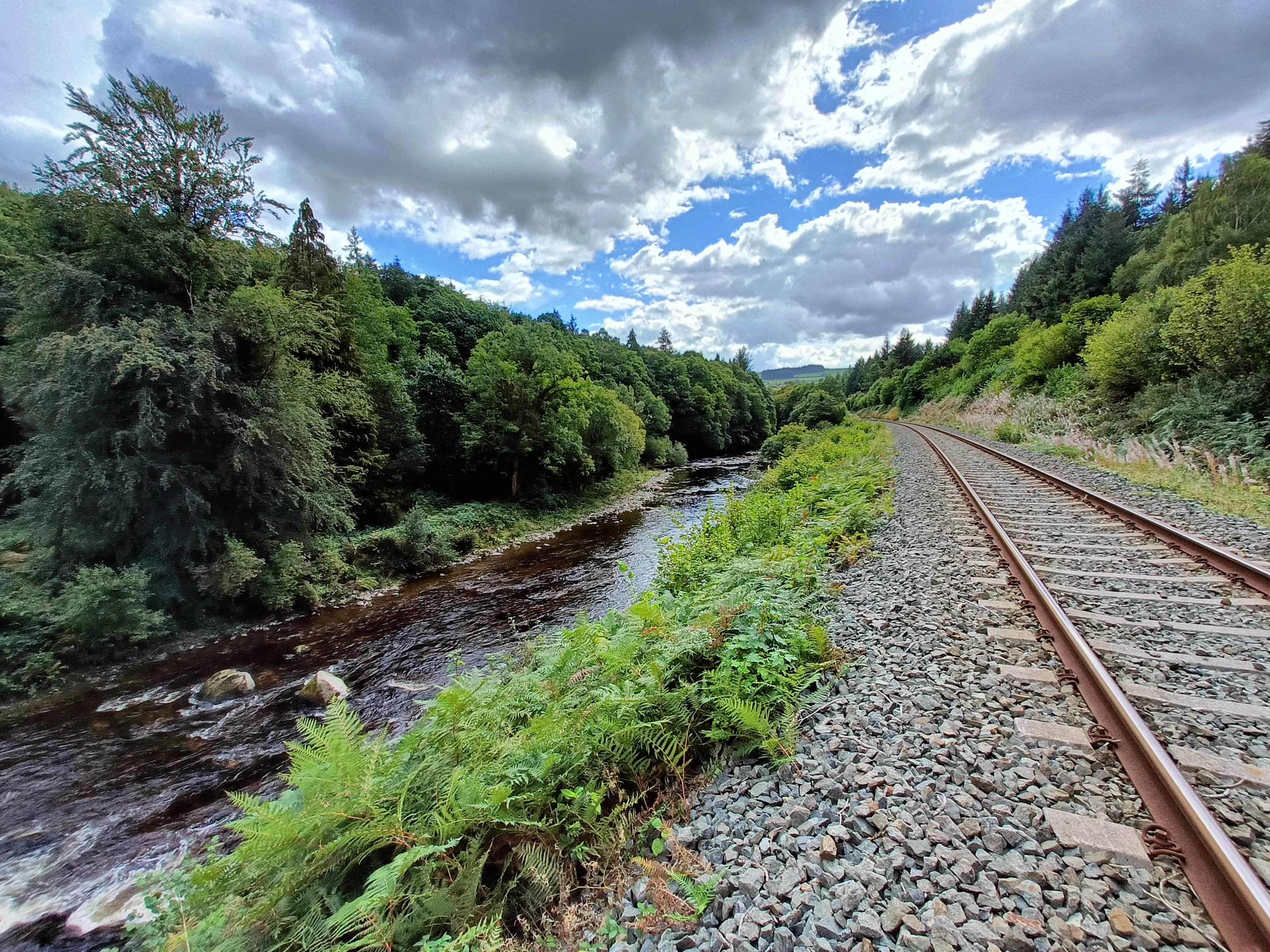Environmental Sustainability
At Iarnród Éireann we are transforming our business to minimise impacts on and maximise benefits to the environment. There are a number of ways we will achieve our goals:

Climate Action Plan
Iarnród Éireann’s corporate Climate Action Plan 2023 to 2030 lays out the pathway to the company achieving emissions reductions of 51% by 2030.
The ambitious plan will be delivered while rail services are expanded, with passenger journeys of 80 million per annum targeted by 2030, up from a pre-COVID high of 50.1 million journeys, and a doubling of rail freight volumes anticipated.
The 51% emissions reduction will be achieved through:
- Reduced reliance on diesel through alternative fuels on existing fleets
- Transitioning to electric-powered fleet
- Green energy generation and corporate purchasing power agreements
- Fleet and building works to reduce energy consumption

Where do Iarnród Éireann’s emissions come from?
In 2022, diesel fuel consumed through rail and road operations accounted for 85% of the company’s overall emissions. Reducing its reliance on diesel fuel is critical to our decarbonisation pathway.

To meet our public sector target of 51% reduction in emissions by 2030, Iarnród Éireann must reduce its combined annual Scope 1 and 2 emissions to circa 70,800 tonnes, while growing the passenger and rail freight businesses at the same time. This in turn supports the overall national reduction in transport emissions.
Read full details of Iarnród Éireann’s Climate Action Plan.
Iarnród Éireann’s 2018 baseline combined Scope 1 and 2 greenhouse gas emissions amounted to 144,400 tonnes of CO2.
These emissions account for approximately 1% of the total national transport emissions (SEAI).
Our Scope 3 Emissions Reduction Strategy outlines how we’re addressing and taking action to manage our indirect carbon emissions produced by suppliers, contractors and other stakeholders up and down our supply chain, ultimately outlining how we’ll achieve a net zero position by 2050.
Climate Change and Rail Resilience
Iarnród Éireann network and services are at the heart of Ireland’s transport system.
Increasing impacts of climate change mean that delivering high quality railway services, during extreme weather-related events, is a constant and evolving challenge for Iarnród Éireann.
Climate change has meant more frequent and intense weather events with rising sea levels, coastal storm surges, stronger winds and temperature increases meaning wetter winters and drier summers. All of these have the potential to adversely impact on railway infrastructure, resulting in great level of service disruption to customers.

Iarnród Éireann is dedicated to improving the resilience of Ireland’s railway to weather and climate impacts in turn enhancing safety, operational and financial performance and delivering a better customer experience.
To safeguard the railway, climate adaption activities must be embedded into how we do things including the maintainance of fleet and railway infrastructure and train operations and procedures.
Read full details in the Iarnród Éireann Climate Adaptation Strategy and see more on the activities the extended team undertake to keep the network running in the video below.
Our company Energy Policy gives an overview of our commitment to reducing our energy consumption through energy improvements.
Environmental Management
There are areas of our business and operations that have significant environmental impacts. Two departments, the Chief Mechanical Engineering (CME) and the Chief Civil Engineering (CCE) Departments, hold the largest environmental aspects. These departments are certified to the international standard for Environmental Management (ISO 40001:2015). It is our responsibility to minimise, as far as is practicable, the impact of our activities on the environment and to reduce our consumption of natural resources.
Some key ongoing environmental initiatives include:
- Remediation of historically contaminated sites
- Improvements in train engine fuel efficiency
- Use of alternative fuels such as biofuels, AdBlue, hydrotreated vegetable oil (HVO), and Hydrogen
- Improvements in building energy efficiency
- Noise mitigation measures
- Improving air quality within stations
- Reducing pesticide usage
- Improvement waste segregation systems
- Circular Economy and waste reduction programmes
- Water management plans for our locations
Our Environmental Policy outlines our commitments to reducing our environmental impacts. More information on our environmental management actions can be found in Sustainability in Motion our sustainability strategy to 2030.
Waste Management and the Circular Economy
We are committed to our 2030 target of 70 percent recycling of all waste, general and construction. It is also our goal that 25 percent of raw material purchases will come from recycled sources and that all contracts for concrete sleeper disposal will prioritise reuse of the material.
Our sustainable procurement practices ensure that all contract specifications for major materials request green alternatives with weightings at tender evaluation stage favouring the more environmentally friendly option.
You can read more on our sustainable procurement practices and circular initiatives in our Sustainability in Motion Strategy 2024 – 2030.
Protecting and Enhancing Biodiversity
With the boundary along our rail network spanning more 4000km throughout Ireland, protecting the diverse landscapes and waterways we operate through is of the greatest importance to us.
There are several programmes in place focused on biodiversity enhancement and the protection of the natural environment.
- Vegetation management where invasive species are present & species protection.
- Investment in reforestation. 300 native trees were planted at Ballykilty, Co Wexford as part of a carbon mitigation plan for our Net Zero Work Site project.
- Pollinator plans at all stations as part of the All-Ireland Pollinator Plan, one-third of our stations now have this in place.
- Vegetable gardens in Castlebar & Westport stations
The company’s Biodiversity Guidelines provides a comprehensive handbook to all infrastructure staff to protect the natural environment – including animal, plant and marine life - encountered in the management of maintenance of tracks, stations, bridges, signalling and electrical equipment.
The railway corridor, for both passenger and freight services, passes through a range of different land types and requires regular maintenance of tracks, stations, bridges, signalling and electrical equipment. These Biodiversity Guidelines, along with our Biodiversity Policy, will ensure all essential works carried out consider the complete ecosystem at any location and ensure works are carried out without interfering with or having impact on the surrounding environment.
Here is our ecologist Jayne Ryan with an example of how we protect the water eco-system during bridge works.



